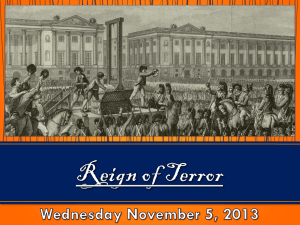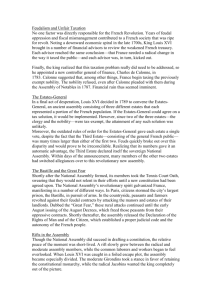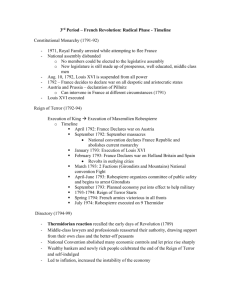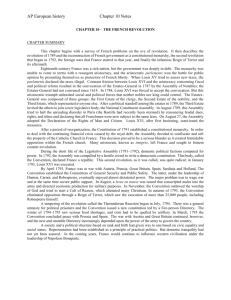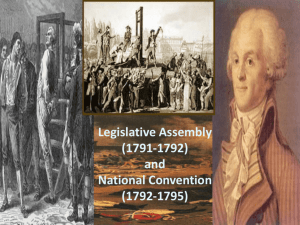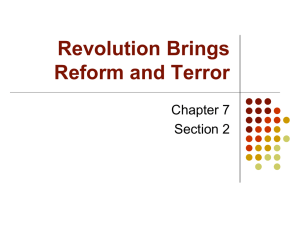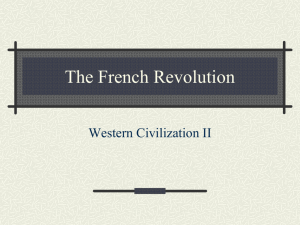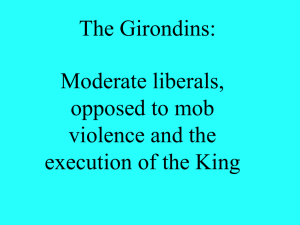Maximilien Robespierre
advertisement
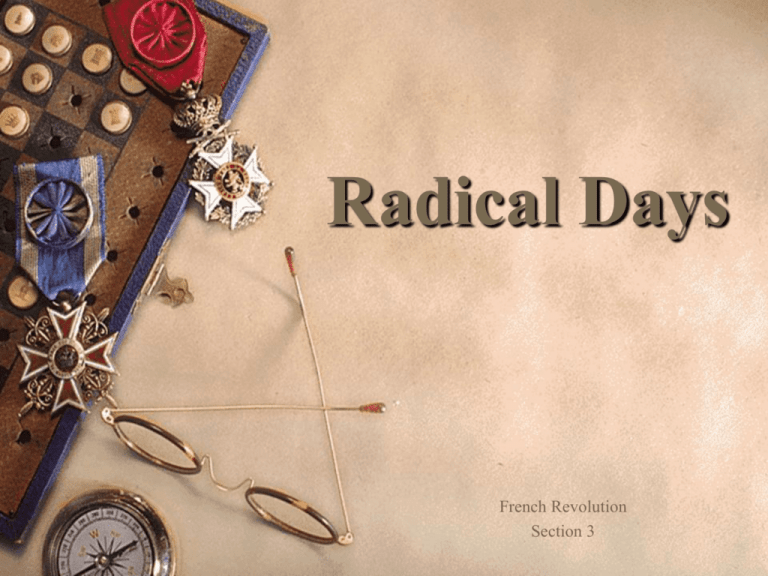
Radical Days French Revolution Section 3 Vocabulary Suffrage: Right to vote Nationalism: An aggressive feeling of pride in, and devotion to, one’s country National Convention (a.k.a. “The Convention”): France’s legislative assembly during the first years of the French Republic (September 1792 to October 1795) Outbreaks of Violence The French had declared war on numerous countries, and these battles were not going well Revolutionaries blamed Louis XVI and Marie Antoinette for the military struggles, suggesting he was in cahoots with the foreign armies August 10, 1792: Crowd invades Tuileries, slaughter king’s guards as royal family runs to the Legislative Assembly to avoid the mob Outbreaks of Violence September 1792: September Massacre – Citizens attack prisons filled with nobles and priests accused of political offenses – Hundreds, possibly just over 1,000, were killed The Convention Radical members took over the Legislative Assembly, called for elections for new body – the National Convention – Suffrage to be extended to all male citizens • Wouldn’t have to own property The Convention abolished the monarchy, created a Republic, and created another constitution – Jacobins (leading “party”) led charge to seize nobles’ land, abolish noble titles, required French men and women be called “Citizen” • Louis XVI was now Citizen Capet Death of Citizen Capet Louis XVI went on trial for treason, was convicted by one vote, and sentenced to death “ The procession lasted almost two hours; the streets were lined with citizens, all armed, some with pikes and some with guns … they had placed before the horses a number of drums, intended to drown any noise or murmur in favour of the king … ” – Henry Essex Edgeworth, priest “ Death of Citizen Capet ” I die innocent of all the crimes laid to my charge; I pardon those who have occasioned my death; and I pray to God that the blood you are going to shed may never be visited on France.” – King Louis XVI’s last words, according to Henry Essex Edgeworth January, 21 1793: Louis XVI is beheaded by the guillotine “ … with one stroke severed his head from his body. All this passed in a moment. The youngest guard … immediately seized the head, and showed it to the people as he walked round the scaffold … cries of ‘Viva le Republique!’ were heard … ” – Henry Essex Edgeworth, priest Death of Citizen Capet Death of Widow Capet October 1793: Marie Antoinette goes on trial, facing numerous charges, and is also found guilty and sentenced to death October 16, 1793: Marie Antoinette is sent to the guillotine The Other Women Many women were disappointed with the Declaration of the Rights of Man because it did not grant them equal citizenship 1791: In response, a female journalist named Olympe de Gouges demanded equal rights in the Declaration of the Rights of Woman Olympe de Gouges Women would gain some rights – Divorce became easier • Done primarily as an attack against Church authority – Women allowed to inherit property • Done primarily as an attack against nobility “ ” Woman is born free and her rights are the same as those of man … All citizens, be they men or women, being equal in the state’s eyes, must be equally eligible for public offices, positions, and jobs … [Women] have the right to go to the scaffold; they must also have the right to go to parliament.” – Olympe de Gouges, Declaration of the Rights of Woman Convention Under Siege Lots of problems in early 1793 – At war w/most of Europe … not going well – In the Vendee region, royalists & priests led peasants in rebellion against new government – Sans-culottes demanded relief from food shortages & rising prices – Jacobins and Girondins at each other’s throats Soon, recruits inspired by revolutionary fervor marched off to defend France Effective new tactics developed French began winning military battles Monarchs feared spread of “freedom fever” Committee of Public Safety To deal with threats to the France and its new government, the Convention created the Committee of Public Safety – 12-member committee w/almost absolute power Who would ultimately rise to the top of the Committee of Public Safety? Maximilien Robespierre Maximilien Francois Marie Isidore de Robespierre Born May 6, 1758 in Arras, France Conceived out of marriage, so parents had shotgun wedding At age 17, gave welcome address to newly crowned King Louis XVI Third-generation lawyer 1782: Appointed as a criminal judge, but quit job to avoid issuing death sentences “The Incorruptible” Or the Bloodthirsty Dictator Member of the Jacobins Created Cult of the Supreme Being Died July 28, 1794 (aged 36) in Paris, France Robespierre Robespierre had embraced Rousseau’s idea of the general will while also promoting religious toleration and the abolishment of slavery Believed France could achieve a “republic of virtue” only through the use of terror “ Liberty cannot be secured unless criminals lose their heads. ” – Maximilien Robespierre Reign of Terror Robespierre was a chief architect of the Reign of Terror (July 1793-July 1794) – Courts conducted hasty trials where spectators greeted death sentences w/cries of “Hail the Republic!” or “Perish the traitors!” – About 40,000 people killed • 15% were nobles and clergy • 15% were middle-class citizens • Remaining 70% were peasants and sans-culottes involved in riots and revolts against the new Republic – Became a witch hunt – Essentially ends with the execution of Robespierre The Directory With the Reign of Terror over, the French abandoned the radical Jacobins and moved towards the more moderate leaders Another constitution (3rd in 6 years) was written – Constitution of 1795 established a five-man Directory and a two-house legislature to be elected by property-owning male citizens The Directory The Directory held power from 1795 to 1799 Same old problems: Weak but dictatorial, leaders corrupt, problems were not fixed As problems continued to grow, politicians soon turned to a popular military hero – Napoleon Bonaparte – whom they believed they could control and manipulate Nationalism Revolution and war gave people a strong sense of national identity – Loyalty originally went to local authorities – Monarchs centralized power and loyalty Social Reform Elementary education became mandatory The Convention set up state schools – Replaced Catholic schools Slavery abolished in French West Indian colonies Religious toleration extended … yet many religious festivals banned in favor of secular celebrations

